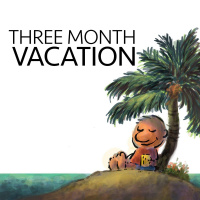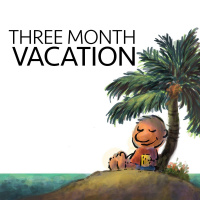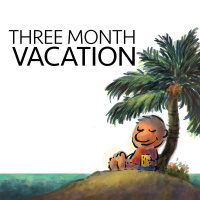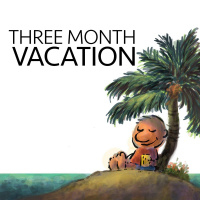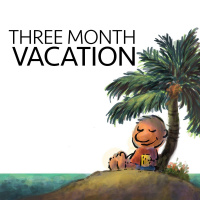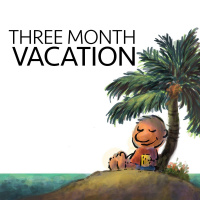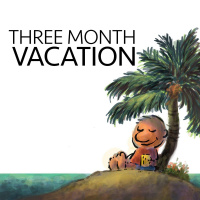Synopsis
The purpose of growing a business isn't just revenue. Revenue and profits run the business, but it's the ability to do what you want, when you want, and where you want. That's control. And that's what most small business owners never achieve. The Three-Month Vacation shows you how to create a powerful business, while still taking generous amounts of time to relax and unwind.
Episodes
-
How To Sell A Product When There's No Scarcity Factor
25/01/2019 Duration: 30minSo much effort goes into the launch of a product, but what happens next? How do you handle the calm after the launch? How do you keep selling products on an ongoing basis? These are the questions we tackle in this episode as we get rid of the "post-launch" blues. Click here to read the full transcript.
-
Persistent Myths of Pricing (And How To Overcome Them) - Part One
18/01/2019 Duration: 26minWhen we price a product or service we often use the ending 7 or 9. As in $27 or $29. Is there any basis for using such an ending? Yes, there is, but does it help to sell more products or services? This is the journey we go on, as we explore the crazy world of pricing. How to set prices shouldn't be voodoo and yet it is. Let's go on this trip by first removing the silly myths. Click here to read the full transcript.
-
Mental Barriers That Slow You Down (And Derail Your Progress)
11/01/2019 Duration: 24minHow many books do you read in a year? Most people boast about how they read hundreds of books a year. That's what I used to do as well. Until I found that I wasn't really absorbing any information. So is speed reading a bad idea? Well, not entirely, but you need to know when to use it and why. Find out how speed works for you and more importantly, when it fails. Click here to read the full transcript.
-
How To Thrive and Succeed In The Midst Of Chaos
04/01/2019 Duration: 31minMost of us have grand plans to succeed. Yet, almost the moment we start there are a million distractions in our way. Chaos lurches around in our doorway and there seems to be no way out. At Psychotactics, we had managed to get around most of the chaos but then I was in charge of mentoring my niece. As she moved from Year 6 to Year 7, it seemed like we were hit by an okinami of chaos. What did we do to find our way out? How did we manage to avoid the madness that we had no control over? Find out in this episode of The Three Month Vacation. Click here to read the full transcript.
-
How To Achieve A Lot—The Three Part Formula
28/12/2018 Duration: 28minHow do you maintain a high productivity level when switching tasks? How do you get the brain and body to handle the transition? And how do you manage the transitions with a minimum amount of fuss? Click here to read the full transcript.
-
Three Steps To Getting Your Uniqueness Recognised
22/12/2018 Duration: 29minWhen you create or find your uniqueness, do you need to test it? Incredible as it seems there's little point in doing any testing at all. In this episode you'll find out why testing is practically impossible and how instead of wasting time on research, you should follow three steps to make sure your uniqueness occupies a permanent part of your client's brain. Click here to read: Three Steps To Getting Your Uniqueness Recognised
-
How to Avoid Gaping Holes in Your Article Writing (and How Objections Fill Those Gaps)
14/12/2018 Duration: 24minObjections aren't something we necessary think about when writing articles. We're so focused on the main content that we might see no need to contradict ourselves. Yet, it's this very contradiction that makes the article more robust and removes those chunky holes. Let's find out why objections are crucial in our articles. Click here to read the article online:
-
Coaching Series: Why Clients Nod But Don't Call - Part Three
07/12/2018 Duration: 26minOne of biggest problems with any sort of prospecting is the dead silence right after clients love what you've said or done. You'd think they'd call immediately, but there's not a peep out of them. Is there some flaw in the system? And how can you overcome this obvious glitch? Click here to read online: Coaching Series 3/3: Why Clients Nod But Don't Call ________________________________________ How do you Find Prospects? Red Bull has the highest market share of any energy drink in the world, with 6.302 billion cans sold in a year. However, it almost never got started. Before the launch, part owner, Dietrich Mateschitz hired a market research firm to test Red Bull's acceptance. The result was a complete let down “People didn't believe the taste, the logo, the brand name. “I'd never before experienced such a disaster.” But Mateschitz believed the product would do well if he placed it in the right market. Which is precisely what he did His insight was to target not just students, but trendy students in universiti
-
Coaching Series: How Niches Can Easily Be Found in Recurring Client Problems - Part Two
30/11/2018 Duration: 19minWe all struggle to find niches when trying to get into the coaching game. But is it really that hard? Or have we been looking in the wrong places? This episode shows you how you can find dozens of niches, all of which have great power and are profitable now and for years to come. Click here to read online: Coaching Series 2/3: How Niches Can Easily Be Found in Recurring Client Problems ________________________________________ In 2010, Gillette blades dominated the market at 70 per cent. Six years later, they were down to 54% How can Gillette get back into the game? Phil Masiello is one of the reasons why Gillette is losing market share. Masiello founded 800razors.com and sales at his company were up to about $2 million annually before he sold it. However, Masiello is only one among many competitors. Harry's, Dollar Shave and other smaller razor and blade companies are all responsible for the drop in Gillette's market share. It's Phil Masiello, himself who has the best advice for Gillette. “Gillette makes a gr
-
Coaching Series: How To Start Up With A Great Niche - Part One
24/11/2018 Duration: 30minThe toughest part of coaching isn't necessarily coaching itself. Instead, it's the niche, isn't it? How do you go looking for the right niche? And how do you know when you've found one that's rewarding as well as profitable? We go back in time with the British Cycling Team and what turned them into champions, and how their coach played a role. We also look at how Pilates went from being everything to everyone to finding a solid niche. Listen and enjoy. Click here to read online: Coaching Series 1/3: How To Start Up With A Great Niche ________________________________________ Hand washing is not exactly the activity you'd indulge in if you wanted to win the gold medal at the Olympics. Yet, that's exactly what the British Cycling Team did at the 2008 Beijing Olympics. They hired a surgeon to teach the athletes to properly wash their hands, in order to avoid illnesses during competition. The team staff were utterly fastidious about food preparation. They even brought their own mattresses and pillows, so that the
-
Writer's Block Series: How a Lack of Energy, Not Time, Causes Writers to Stall and Crash - Part Four
16/11/2018 Duration: 21minOne of the biggest hurdles in writing, has nothing to do with writing at all. It doesn't have anything to do with time, either. Instead, it's an understanding of energy. Without a clear view of how energy works, we're likely to start off strong and then find ourselves stranded. Is there a way around this energy hurdle? What causes an energy loss? Let's find out in this episode. Click here to read online: Writer's Block: How a Lack of Energy, Not Time, Causes Writers to Stall and Crash
-
Writer's Block Series: Why Discussion and Feedback Are A Writer's Secret Weapon (And How Professionals Use it to Their Advantage) - Part Three
09/11/2018 Duration: 21minHow do you speed up your writing process and what causes it to slow down to a crawl? Surprisingly, discussion and feedback play an incredibly powerful role in unblocking Writer's Block. The more you're stuck, the greater the reason to invite discussion and feedback. The moment you do, it causes you to explain the concepts in a way that catches you totally by surprise! Click here to read online: Writer's Block 3/4: Why Discussion and Feedback Are A Writer's Secret Weapon (And How Professionals Use it to Their Advantage) ________________________________________ C) Discussion and Feedback If you drop me in Kyoto or Paris, I'll walk happily for hours. However, the moment I have to exercise, I detest the very concept of walking. And yet, day after day, year after year, we go for a walk. It's healthy of course, and I actually learn stuff or listen to music, but the most crucial part of the walk is the part right up to the traffic lights. It's about a ten-minute walk from our house to the lights, and that's when I t
-
Writer's Block Series: Why Cross Pollination of Ideas, Media and Styles Are Crucial (And Avoids Shutdowns When Writing) - Part Two
02/11/2018 Duration: 23minMost of us are content to learn a great deal about what's happening in our industry, but is that causing a blockage when it comes to writing? When we go into the depths of writer's block, we find that you need cross pollination not only across industry, but across styles as well as media such as video, audio and text. Find out how a lack of cross pollination could be causing your writing to freeze up.
-
Writer's Block Series : Why the Lack of Outlines Even Stops Professional Writers In Their Tracks - Part One
26/10/2018 Duration: 16minIf you're already good at writing, do you need an outline? It might seem one more barrier and yet it's the first element that creates this so called Writer's Block. Find out why outlines are a map that quickly get you to your destination. Click here to read online: Writer's Block Series 1/4: Why the Lack of Outlines Even Stops Professional Writers In Their Tracks ________________________________________ If you give employees a bonus, will they work harder? This is the seemingly obvious question that Michael Sturman had to contend with. Sturman, a professor at Cornell’s School of Hotel Administration, decided to find just how much pay and performance mattered. And as you'd expect, he found the obvious. People who are paid above the market rate, do a much better job. As you'd imagine, he found that even a 1% raise, can tend to boost employee performance to about 2%. However, when the same 1% bonus was linked to a specific task, the job performance spiked as high as 19%. Turn that statistic around, and we can sp
-
Want To Get Paid A Lot In Advance? Three Methods To Get Paid Earlier
19/10/2018 Duration: 26minOne of the most mind numbing tasks is to get a client to pay for the job you've completed Clients tend to be slow with payments or just default. But is there a way to avoid such a mess? There's not just one, but three separate ways to go about it. Let's find out how you can get paid without all the bother—and well in advance, too. Click here to read online: Want to get paid a lot in advance? 3 Methods to get paid earlier than ever before ________________________________________ What is this life if, full of care, We have no time to stand and stare. No time to stand beneath the boughs, And stare as long as sheep or cows. No time to see, when woods we pass, Where squirrels hide their nuts in grass. Wouldn't it be a bit of shame that we have no time to look at sheep and cows because we're trying to get paid on time? There's no foolproof system to get paid every time, but if you pay attention to how other industries work, you might never have to chase payments again. There are three core methods to use: – The Co
-
Why Unfamiliarity With Your Research Stories Will Make Them Worthless
12/10/2018 Duration: 16minMost of us are quite obsessed with stashing away case studies, examples and stories. However, it's not enough to simply put it away. You have to be reasonably familiar with the story. And how you get to be familiar? You focus on one point in the story. Why does that one point matter? Let's find out.
-
Fritoons Announcement
09/10/2018 Duration: 01minThis is not a regular podcast episode but a quick announcement about Fritoon... Your chance to receive a funny cartoon direct to your inbox every Friday. Visit psychotactics.com/fritoon , to sign up! Enjoy
-
How To Research An Article (Without Killing Your Productivity)
05/10/2018 Duration: 29minResearching an article is so frustrating because it's time-consuming But there are ways to beat the pressure—and the pain. Believe it or not, there are ways to be productive with zero last minute research. This episode shows you how to make advance research work for you, as well as in situations where you have no research at all. Sounds too good to be true? Well, listen to the episode. Click here to read online: How to research an article (without killing your productivity)
-
How to Use "Transition Techniques" to keep your reader locked into your article
29/09/2018 Duration: 20minReaders often get lost in an article and hence abandon it. However, there are pretty simple, yet powerful methods to let the reader know exactly where they are in the article at all times. Plus when you use these techniques, you push the reader forward as well. Here's how you go about using these "Transition Techniques". Read on the website: Transition Techniques
-
The story of why the Psychotactics Website took three long years—and a month—to complete
22/09/2018 Duration: 26minWebsites are daunting projects but even the casual listener is astounded to learn that a website took three years to complete. Of course there's a story, so here we go with the tale. Read on the website: New Psychotactics Website Story ==== Back when I was in university, my friend, Shelly Brown sent me a recording of a rap band called Run DMC I listened to the music patiently, then decided rap had no future. As you can see, I'm a lot worse than most people at predicting the future. Even back in 2008, I had friends in the industry, who were talking about mobile as being the next big thing. But there we were in the middle of 2015 with no intention of creating a mobile-friendly site. I figured mobile had no future, so why bother with a new website when the existing website was doing just fine? However, what prompted me into action was a little chat with a client This client was into some sort of search engine optimisation, and he suggested it would be a good idea to create a new site as well. While we'd designe













